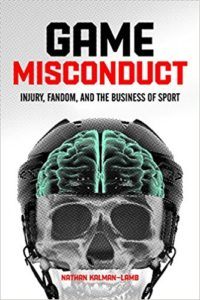Last night was a moment for the celebration of a hoisted Cup, the end of a grueling and gratifying journey of athletic triumph for the Washington Capitals.
I’m not here to talk about that.
Because now, in the immediate afterglow of that achievement, is precisely the moment when we need to pause and consider what happens for players after the cheering stops and the champagne showers dry up. What comes next, in the broadest sense of the term, for the NHL’s gladiators? The brutal truth is that the lingering experience for professional hockey players is not the ecstasy of hoisting the cup, but the agony of what follows.
I have no doubt that most players on the Capitals today would swear that the rewards of Stanley Cup success are worth the toll that athletic labor takes on their bodies. This is, after all, the logic they’ve been conditioned to swallow since the first time they watched Hockey Night in Canada as a child, and it is a credo that is continuously reinforced by coaches, trainers, teammates, and fans. It is also, to be frank, a lie.
Former players, blessed and cursed with the perspective of distance, experience, and years of suffering, often weigh the value of the Stanley Cup and other NHL accolades rather differently.
One former player I interviewed for my new book Game Misconduct: Injury, Fandom, and the Business of Sport, who spoke at length of his love for game and passion for being a pro player, but whose career was shortened by a devastating (and medically mistreated) knee injury, said of his attitude to hockey today: “I very rarely watch a full game, it might be on TV or something, but I very rarely will follow a team. I’m not a fan of the game.”
Likewise, four-time Stanley Cup champion and all-time great Mike Bossy remarked, in a letter to his past self, that he recalls little of his storied career: “My biggest piece of advice for you is to try to remember more of it. As sad as it is to say, as I write this to you at 60 years old, I can barely remember anything about lifting those Stanley Cups. I don’t know if it’s all the hits I took, or just because of how overwhelmed I was at the time, but I really cannot remember much.”
While the euphoria of victory is fleeting, what it costs the body is not.
Former Detroit Red Wing Johan Franzen is currently at the Marcus Institute for Brain Health dealing with post-concussion symptoms. For perspective, his fellow patients at the Institute are  military veterans recovering from combat. In 2015, Franzen said of his struggles overcoming concussion symptoms, “For two months, not being able to pick up your kids, or play with your kids, for more than 2 minutes — it makes you think a little bit. I was in a really dark place, maybe not the first month because then you still think it’s going to get better, but then when it doesn’t get better, you kind of start wondering.”
military veterans recovering from combat. In 2015, Franzen said of his struggles overcoming concussion symptoms, “For two months, not being able to pick up your kids, or play with your kids, for more than 2 minutes — it makes you think a little bit. I was in a really dark place, maybe not the first month because then you still think it’s going to get better, but then when it doesn’t get better, you kind of start wondering.”
Former Washington Capitals enforcer Stephen Peat, who played for the team between 2001-2006, currently sleeps in his truck and experiences symptoms associated with chronic traumatic encephalopathy (CTE) – a disease found in the brains of 99% of deceased former NFL football players examined by a major JAMA study – including severe headaches and memory loss. As he puts it, “I can’t even describe [the pain] right now. My head feels like it’s gonna fall off.”
A former NHL player I interviewed, who told me he can’t even remember if he brushed his teeth minutes after doing so, described the traumatic fallout of the injuries he suffered (damage to his body included many concussions, a broken back, three hand surgeries, and major elbow surgery): “My post-career was terrible… Because you’re up here [gestures with his hands] and now you’re so far in the hole of feelings and depression that it’s not worth being here. My kids don’t even need me here because I’m worthless.”
Indeed, despite all the accolades and glory, even hall-of-famer Bossy is left above all with pain. He writes, in the second person: “The abuse will leave a mark on you forever. Your nose will be broken. Your ribs will be cracked. But it will leave a mark on your soul, too.”
The startling truth of professional hockey for players is that, too often, even the most glorious wins on the ice become losses in life. One has to wonder: was that champagne or Kool-Aid that players were swilling from Lord Stanley’s Mug last night?